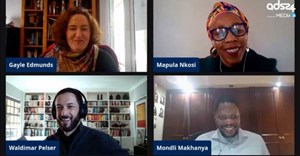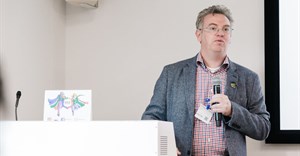Trending



 Clothing brand Curve Gear opens new store in Tygervalley CentreLindsey Schutters
Clothing brand Curve Gear opens new store in Tygervalley CentreLindsey Schutters Sabre EMEA 2024 Awards: Razor PR, Retroviral top SA agenciesDanette Breitenbach
Sabre EMEA 2024 Awards: Razor PR, Retroviral top SA agenciesDanette Breitenbach
Elections 2024
Media freedom: where did SA media go wrong?
"Is our media that bad? Yes, on some levels," MMA executive director William Bird said recently.
While the MMA continues to decry the lack of women's voices and children in newspapers in a country where rape, domestic violence and child abuse are often likened to Olympic sports, Bird still fumes about what he called the 'despicable' role played by newspapers in fomenting xenophobic violence in 2008.
He also lamented that despite SA boasting one of the best Constitutions in the world, the media rarely venture in that field to showcase the country's progressive legislation.
"Stop writing headlines such as Drain Boy's Body Found or Dog-Sex Girl's Poverty to Blame," he urged the media.
A decline in quality journalism
SA's juniorisation of newsrooms has come as the result of overworked but underpaid senior news staff leaving the profession to seek greener pastures. This, coupled with lack of ongoing training, has led to the decline in the quality of journalism, according to some analysts.
"What is clear from our perspective is that our media in several respects is not living up to its responsibilities, and in most instances there are no simple answers, mostly shades of grey," Bird indicated.
"But collectively it is our view that the media is progressively albeit gradually getting better."
Furthermore, Bird lashed out at the ruling ANC for capitalising on some of the media's weaknesses to justify its creation of a Media Appeals Tribunal.
In its media document up for discussion later this month at its national general council, the ANC accuses the media of showing an 'astonishing degree of dishonesty',' lack of professional integrity' and 'lack of independence'.
A visibly incensed Bird hit back at the ANC, saying: "How do you measure that? This is non-sense, rubbish! To our knowledge a comprehensive study of this nature has not been carried out in South Africa. No evidence for these claims is presented in the document.
Principles of journalism
"Balance, fairness and accuracy - these are the key tenets of good journalism. If our media is failing in these, it would require something radically different to a statutory media tribunal," Bird charged at the ANC.
He nevertheless praised the media for 'achieving what no media in a developed country has done before' - a 'perfect' coverage of elections.
"On the issue of fairness we can take some pride in the knowledge that on average over 80% of all elections items monitored since 1994 were fair," he said.
"In 2009 this figure was 84% across the 56 different media monitored, with the ANC receiving the lion's share of coverage across all media monitored for all elections, averaging 47% in the 2009 elections."
SANEF chairman Mondli Makhanya said last week: "We should be very careful not to put weapons at the hands of our enemies to hit us. We should up our game at 200%."
Like all institutions, media has challenges, Bird said, urging SA society, including the rural, urban, rich and poor people, to challenge the ANC's proposed media tribunal and other proposed bills such as the Secrecy Bill, Public Service Broadcasting Bill and ICASA Amendment Bill.
- Bizcommunity special section: special focus on media freedom
- Bizcommunity Twitterfall: #ZAmediafreedom
- SANEF: www.sanef.org.za
- Google News Search: Protection of Information Bill media appeals tribunal
- Twitter Search: #ZAmediafreedom
- Google Blog Search: Protection of Information Bill media appeals tribunal












![[IAB Digital Summit 2016] The sting in the tail](https://biz-file.com/c/1603/333848-300x156.jpg?2)